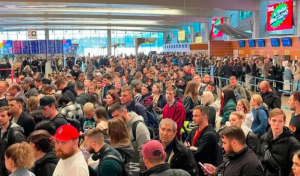Names of 425,000 suspected Nazi collaborators published
3 min readThe names of approximately 425,000 individuals suspected of collaborating with the Nazis during the German occupation of the Netherlands have been published online for the first time, marking a significant step in the country’s efforts to address its wartime history. These names represent individuals investigated by a special legal system set up near the end of World War II, focusing on suspected collaborators. Of these 425,000, over 150,000 faced some form of punishment after being investigated.
Previously, the full records of these investigations were only accessible at the Dutch National Archives in The Hague, creating a barrier for researchers, historians, and descendants of those involved. The Huygens Institute, which helped digitize the records, explains that the online publication of the names significantly improves access to this crucial information. The database allows people to learn about the Dutch occupation, which lasted from 1940 until 1945, and provides important historical context, particularly for those looking to understand the actions of their ancestors or explore the gray areas of collaboration.
The online archive includes files on war criminals, as well as around 20,000 Dutch citizens who enlisted in the German armed forces, and members of the National Socialist Movement (NSB), the Dutch Nazi party. However, it also includes the names of individuals who were found innocent of any collaboration, as the Special Jurisdiction investigated suspects from 1944 onwards. Historian Hans Renders from the University of Groningen explained that around 15% of the cases went to court, and many individuals had their cases dismissed.
The database does not provide details on whether a person was convicted or what form of collaboration they were suspected of. Instead, it offers the name, birth date, and place of birth of each individual, and users must request additional information from the National Archives to learn more. To access the physical files, visitors must declare a legitimate interest. The files themselves contain further details about the case, including whether the person was found guilty of collaboration, but these specifics are not available in the online records.
Thomas Bottelier, a historian at Utrecht University, noted that this move to digitize the records aligns the Netherlands with other European countries, where access to similar wartime records is generally more open. He pointed out that, compared to countries like Italy, the Dutch records were previously harder to access, despite Italy’s more controversial wartime past.
The project, which has been met with some controversy in the Netherlands, is a critical step in breaking the taboo surrounding the country’s history of collaboration during World War II. The publication of the names has been limited initially due to concerns about privacy, particularly regarding personal information tied to such a sensitive period. Some individuals, particularly the descendants of collaborators, worry about the impact of these revelations on their family’s reputation. Rinke Smedinga, whose father was an NSB member, expressed concerns over the potential social fallout, noting that the past remains a trauma for children of those involved in collaboration.
Research suggests that many Dutch citizens feel uncomfortable with the idea of children of collaborators holding public office, and some are even uneasy about having friends or colleagues whose relatives were collaborators. Historian Renders remarked that for the children of NSB members, the wartime past can be a source of great personal conflict. These children often feel burdened by a secret, despite their own innocence, and may struggle to reconcile their family’s actions during the war.
Tom De Smet, director of the National Archives, emphasized the need to consider both the families of collaborators and the victims of the occupation when making these records public. While he acknowledged that collaboration remains a sensitive and painful subject, he hopes that opening the archives will encourage a societal reckoning with this difficult chapter of Dutch history.
Despite the challenges, the Dutch government is determined to provide greater transparency. Minister Eppo Bruins, in a letter to parliament, reaffirmed that the openness of archives is essential for confronting the past and processing it as a society. He also mentioned plans to amend laws to allow more information to be made publicly available in the future.
The online database website has made it clear that individuals who are still alive will not have their names published, out of respect for their privacy. This step in the digitization of the records offers both opportunities for education and challenges, as the country grapples with how best to confront and process its wartime history.







